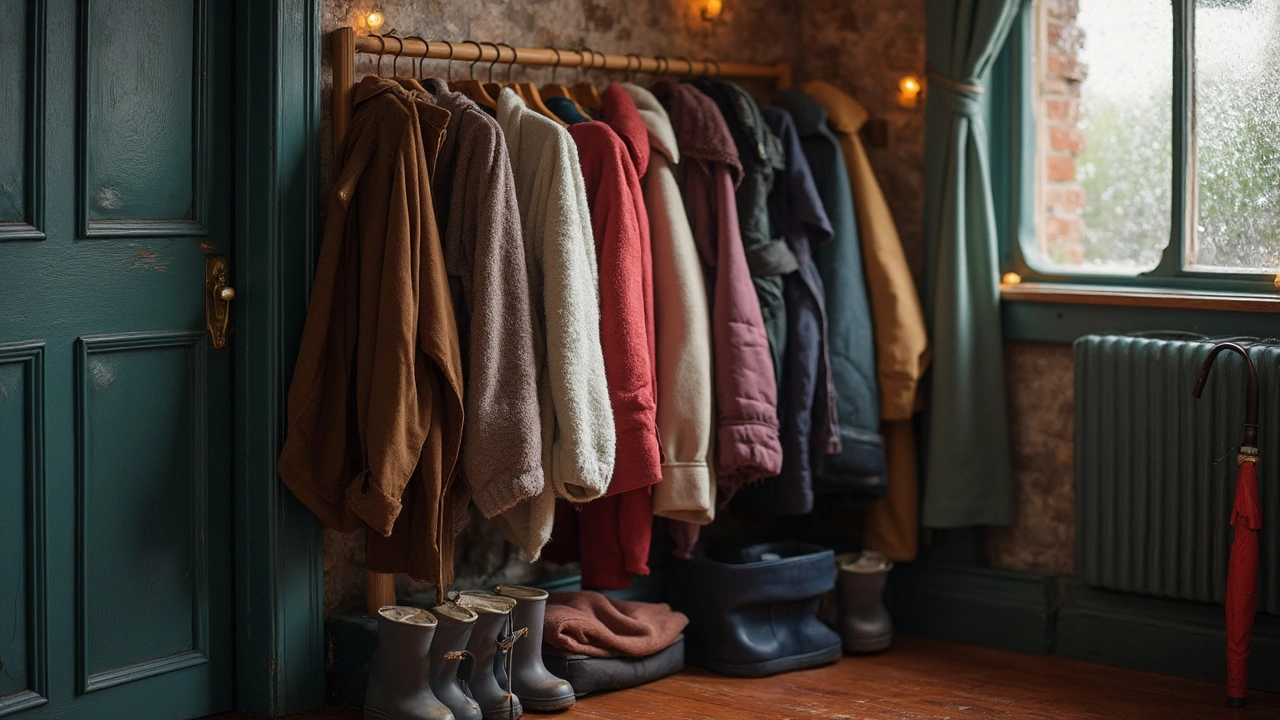Spending a year in Ireland will really test the limits of your coat collection. Whether you’re braving the wild wind on Inis Mór, dodging King’s Inns puddles in Dublin, or shivering outside a GAA match in Mullingar, you practically live in a jacket. Which brings up the real question—when you finally peel it off indoors, is it actually OK to fold your coat?
If your wardrobe space looks more like a box room in Cork than a sprawling walk-in, figuring out the best way to store coats is a daily puzzle. Folding feels tempting—especially with limited space or if you’re stashing winter gear for summer. But coats react differently than a stack of t-shirts. The material, insulation, and even the weather outside all matter, especially with Ireland’s classic dampness lingering year-round.
- Why Coats Get So Much Use in Ireland
- Folding vs Hanging: The Facts
- Common Mistakes (And How to Avoid Them)
- Smart Storage Solutions for Irish Homes
Why Coats Get So Much Use in Ireland
In Ireland, you can’t talk about daily life without mentioning the weather. The country sees rain on over 150 days each year—even the summer months bring their fair share of showers. This means most people grab a jacket or coat before leaving home almost all year round.
Dampness is a constant battle, whether you’re in Limerick or Letterkenny. Irish homes and schools are packed with raincoats, puffers, and waterproof layers. Even those windcheaters from Penneys or outdoor brands like Regatta and Trespass see as much weekday use as school jumpers and uniforms. It’s common for people to own several types: thick parkas for January, thin rain shells for those unpredictable May days, and a smart wool option for the office. Coat storage gets tricky fast—especially if your house is tight on space.
Here’s a quick look at just how often coats are needed across Ireland’s seasons:
| Season | Common Jacket Type | Days per Week Worn |
|---|---|---|
| Winter (Dec-Feb) | Heavy parka, puffer, wool coat | 6-7 |
| Spring (Mar-May) | Rain jacket, light down | 5-7 |
| Summer (Jun-Aug) | Waterproof shell, windbreaker | 4-6 |
| Autumn (Sep-Nov) | Insulated jacket, raincoat | 5-7 |
Any DART or bus ride in Dublin during autumn will show nearly everyone zipped up. Festivals like Electric Picnic are famous for high-vis rain jackets and rubber boots—it’s almost a national uniform. And if you’re heading to a coastal town like Dingle, count on an extra layer windbreaker, even in July.
The bottom line? In the Irish market, folding coats becomes a real issue since these jackets are always in rotation. Knowing how to care for them keeps your wardrobe looking sharp and your investment lasting longer.
Folding vs Hanging: The Facts
When you’re deciding between folding your coats or hanging them up, the material and type of coat make all the difference. The truth is, not every coat in Ireland can handle being folded. Puffy jackets, raincoats, wool blazers—they all react differently if you flip them into a drawer or storage box.
If you’ve bought a heavy winter parka from Regatta or a classic wool coat from Dunnes Stores, these are usually best hung up. Hanging keeps the shape intact and avoids creases in the padding or material. A squashed down coat will lose its puff, and a folded wool coat can develop stubborn creases you won’t iron out easily—especially with Ireland’s pesky humidity always trying to set wrinkles for good.
On the other hand, light rain jackets, synthetic shell jackets for hiking, or fleece zip-ups from Aldi’s Specialbuys are more forgiving. These can be folded without much risk, especially if you use them as back-ups in your bag for Ireland’s surprise showers. But even then, only fold a coat if it’s clean and bone dry—folding a damp jacket is practically inviting mould and that musty smell everyone dreads after a soggy walk around Killarney.
- Folding coats works best for modern, thin, or synthetic jackets—think stuffable Puffas or packable rainwear.
- Hanging is most important for heavier, tailored, or expensive jackets, especially wool and down.
- Always use broad hangers for heavy coats to protect the shoulders and hanging loops for lighter gear.
If you’ve ever opened a hallway wardrobe after a wet Irish autumn and found your nice coat smelling like damp turf, you know why people go the extra mile. Even major dry cleaners in Dublin like The Zip Yard advise avoiding folding thick outerwear for long storage—creases become permanent and odours cling on.
Take a peek at this for a quick comparison:
| Coat Type | Best Storage | Risk if Folded |
|---|---|---|
| Down/Puffer | Hanging | Loss of shape, squashed insulation |
| Wool/Boucle | Hanging | Hard creases, loss of form |
| Light Rain Jacket | Folding | Minimal, if dry and clean |
| Fleece | Folding or Hanging | Minimal, but can get musty if damp |
The Irish weather doesn’t just affect where you go—it affects where your jackets end up living inside the house. Adapt your storage to the coat type, and you’ll get more life out of that expensive winter wear next time the skies open up in Galway or Belfast.

Common Mistakes (And How to Avoid Them)
Loads of people in Ireland unintentionally wreck their coats just because they're short on space or rushing to tidy up. Here’s what usually goes wrong and, more importantly, how not to fall into those traps.
- Folding coats right after coming in: Irish weather is famously damp. Folding a wet or even slightly damp jacket can make it smell musty and go mouldy. Always hang it out to dry—on the back of a chair, a heated airer, or even outside if there’s a rare dry breeze.
- Piling on too many coats: Some people throw all their jackets in one basket or drawer. The bottom one ends up looking like it came out of a bin liner—creased, flattened, and sometimes with the insulation clumped up. That ruins both looks and warmth.
- Using regular hangers for heavy coats: If you have a decently-weighted winter coat from an Irish brand like Magee or Dubarry, flimsy hangers will warp the shoulders and leave you with droopy jackets. Invest in sturdy, broad hangers—the type you see in places like Brown Thomas or Avoca.
- Forgetting pocket checks: With all the bits you pocket—Lucozade stubs from Centra, DART cards, or half-melted chocolate from SuperValu runs—folding coats with stuff in pockets can stretch fabric and cause odd bumps. Empty them out!
- Not airing out between wears: If you fold and store right away, sweaty or stale smells build up fast, especially in insulated jackets. Give them a bit of air on a hook or banister before stashing them.
Here's a quick look at what happens depending on your approach:
| Storage Method | Common Issue | Prevention Tip |
|---|---|---|
| Folding while damp | Musty smell, mildew | Dry fully before storing |
| Piling in one drawer | Flattened insulation, creases | Spread coats out or hang when possible |
| Cheap wire hangers | Shoulder dents, sagging | Use broad, sturdy hangers |
Bottom line? Store your coats and jackets like you actually want to wear them next season. A little habit change saves money, effort, and keeps you looking sharp no matter what Irish weather throws at you.
Smart Storage Solutions for Irish Homes
Anyone who’s lived in an older Irish house knows that wardrobes aren’t always roomy. Apartments in Galway or student digs in Limerick? Forget it—space is precious. If you want to keep your jackets and winter wear looking fresh, you’ve got to get clever.
Let’s start with the basics: Always dry your coats thoroughly before putting them away. Not only does this help preserve shape but it also stops that musty, damp smell nobody wants. If there’s even a whiff of wet, hang them on a radiator or over a drying rack for at least a few hours. This is extra important after those classic Connacht downpours.
When folding is unavoidable, maybe because your place is tiny or you’re swapping wardrobe contents for the season, here’s what works in Ireland’s climate:
- Use breathable storage bags—most Irish stores like Argos, Dunnes, and Home Store + More stock them. Avoid those zip-up plastic types unless you want your coats smelling like a tent after Electric Picnic.
- Line shelves or boxes with old tea towels or cotton pillowcases to absorb extra moisture. Ireland’s humidity means mould can sneak up, especially in houses by the sea.
- Stack lighter jackets on top of heavier ones to prevent squashing and creases. Never wedge them so tight they can’t breathe.
- Regularly air out your stored coats—even once a month is enough. This gives you a chance to spot any early signs of mould or unwanted smells.
If you’re working with a cramped space, try some of these tried-and-tested hacks straight from city renters:
- Add an extra tension rod in your wardrobe for more hanging room—Smith’s DIY in Dublin has these for under €10.
- Hooks behind doors work wonders for everyday jackets, so you always have one to grab on the way out when the weather flips (so, basically, always).
- Vacuum storage bags can save space for thick ski parkas, but don’t use them for premium wool or down, as squashing can ruin insulation. Save these for cheap fleeces or emergency rain ponchos for Slane concert season.
Check out this quick local comparison of popular storage options:
| Storage Solution | Good For | Where to Find in Ireland |
|---|---|---|
| Breathable Garment Bags | Wool, Down, Parkas | Arnotts, Dunnes, Home Store + More |
| Vacuum Bags | Fleece, Rainwear | Argos, IKEA, TK Maxx |
| Tension Rods & Hooks | Everyday Jackets | Woodie's, B&Q, Smith's DIY |
Treating your folding coats with a bit of care at home can mean less trips to the dry cleaners and more time enjoying Irish weather—come rain or shine (or, most likely, both in one day).
